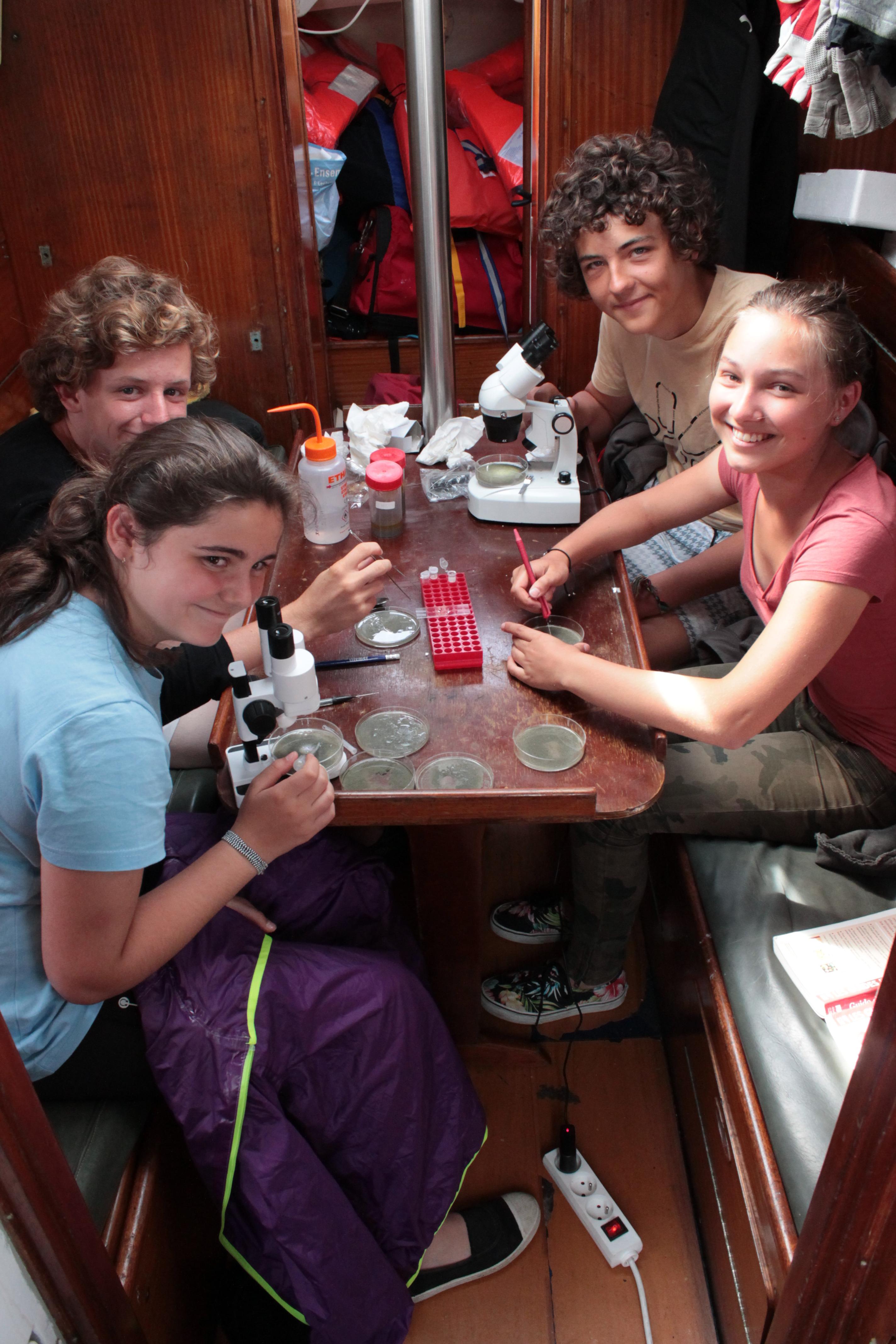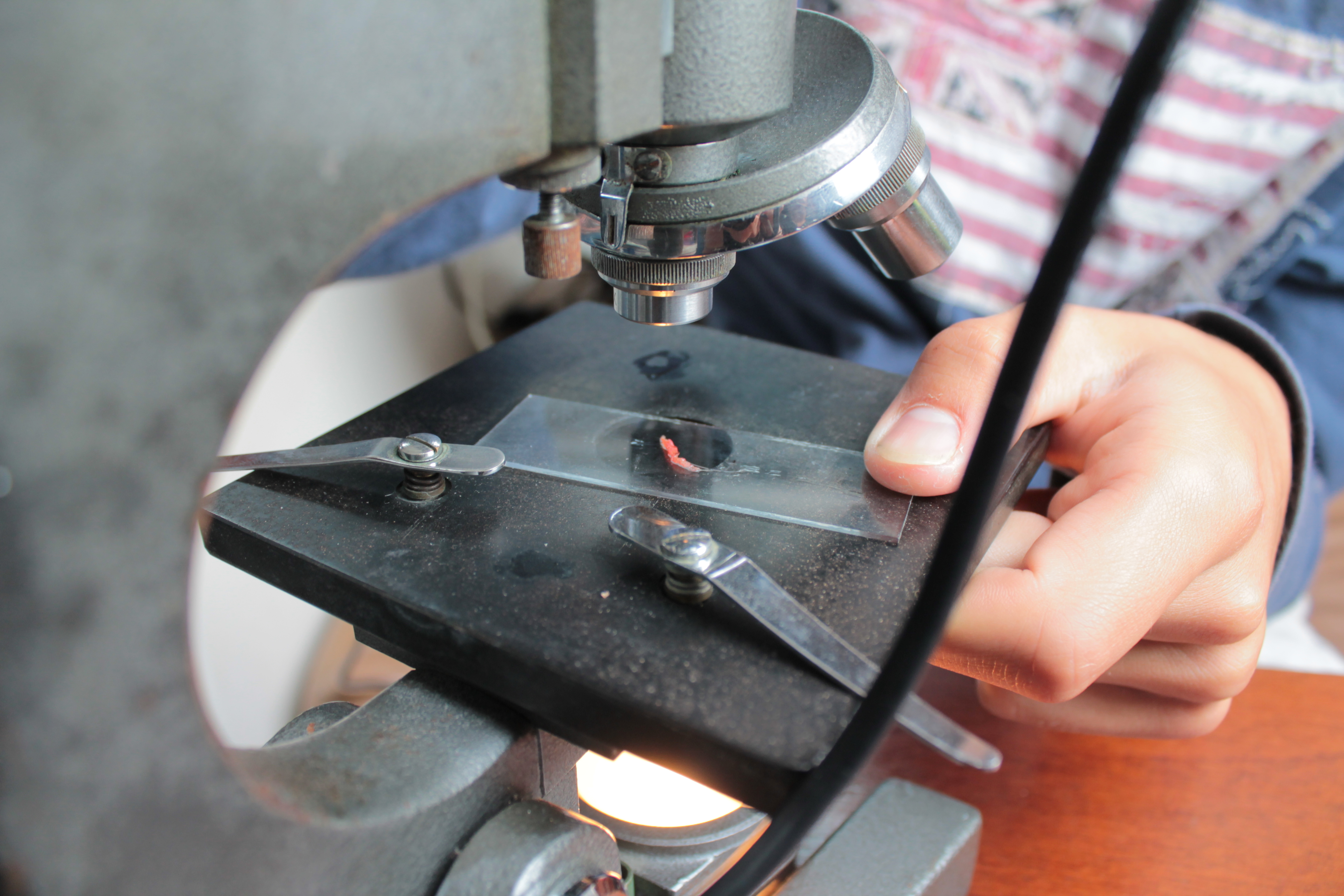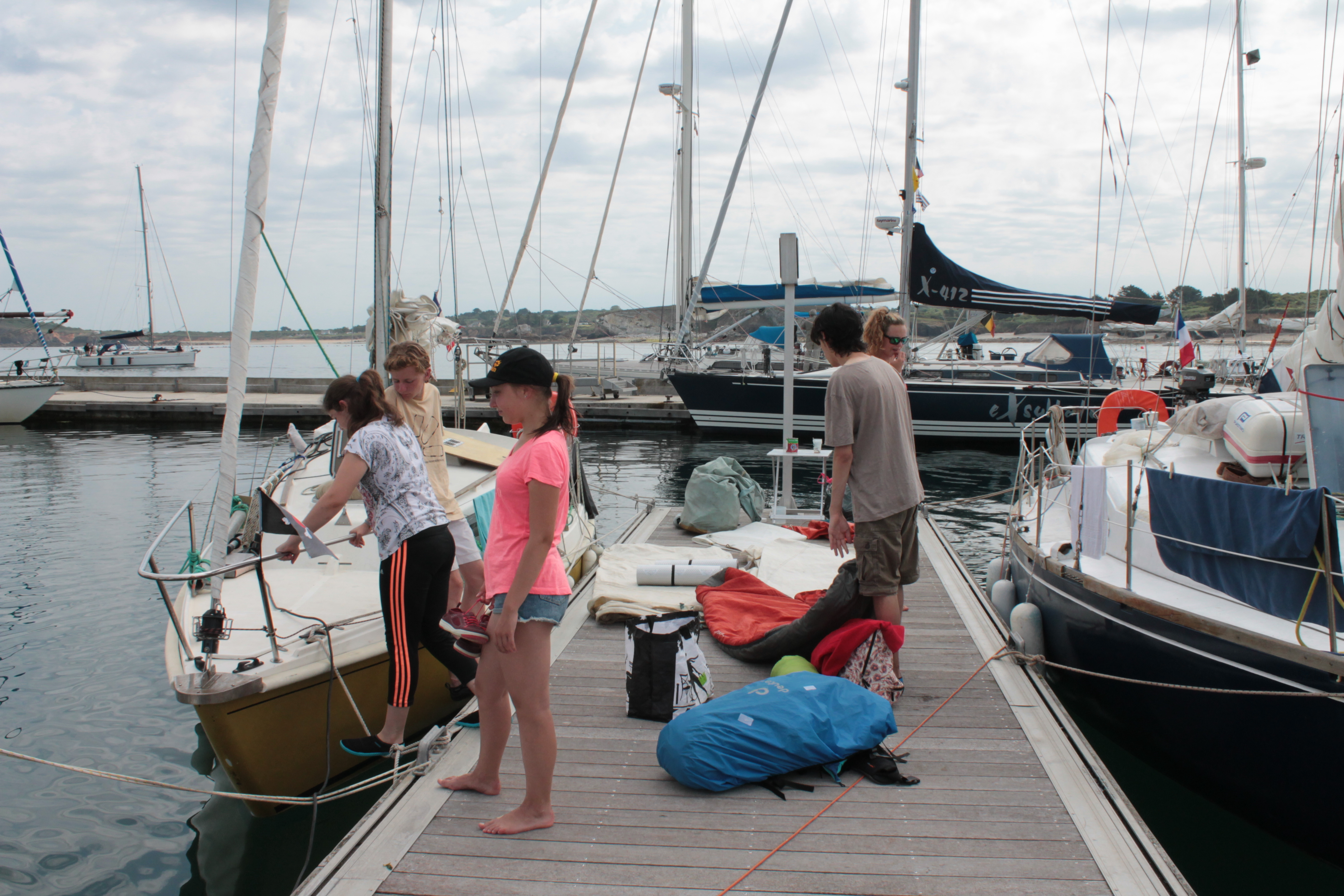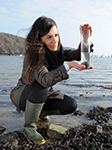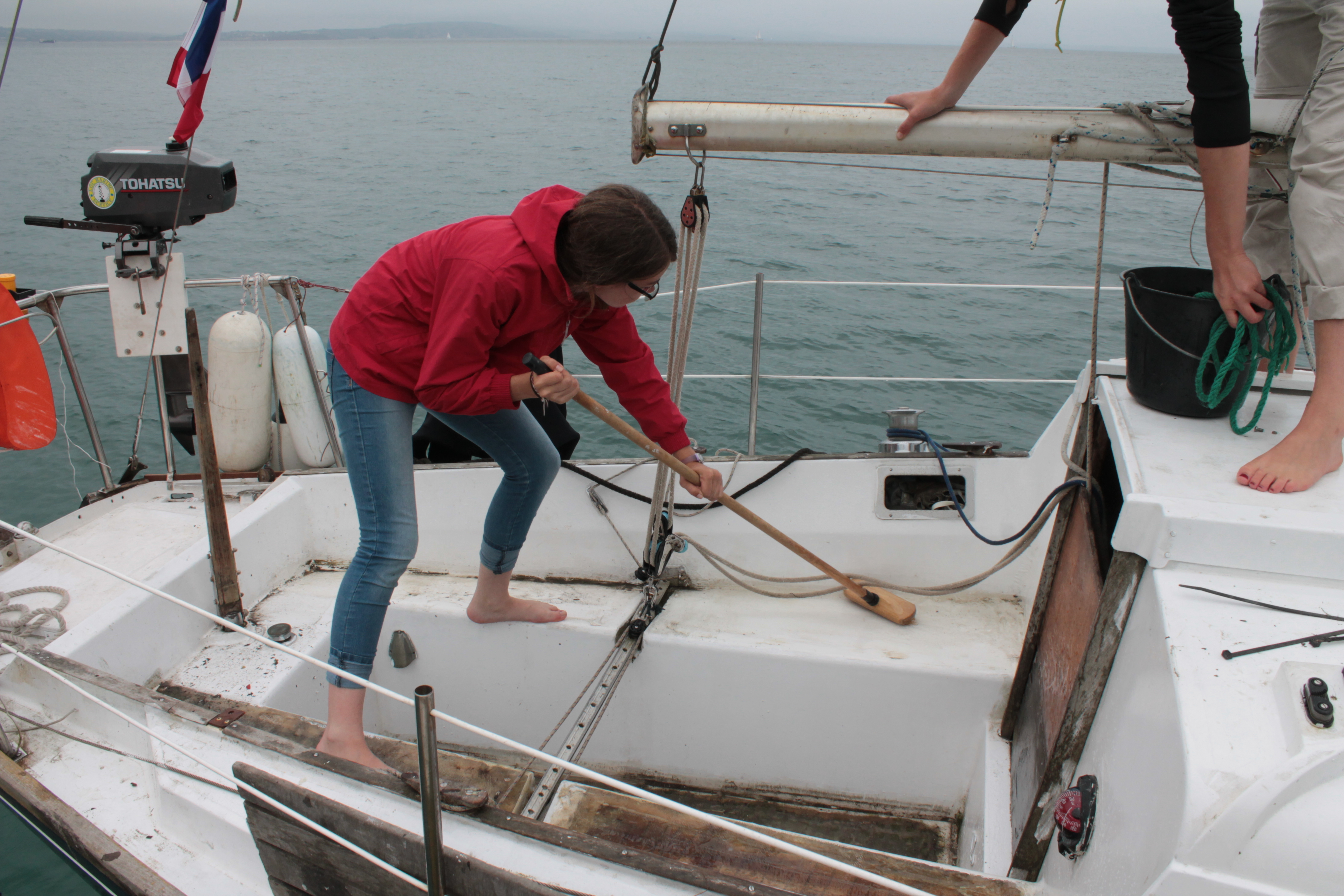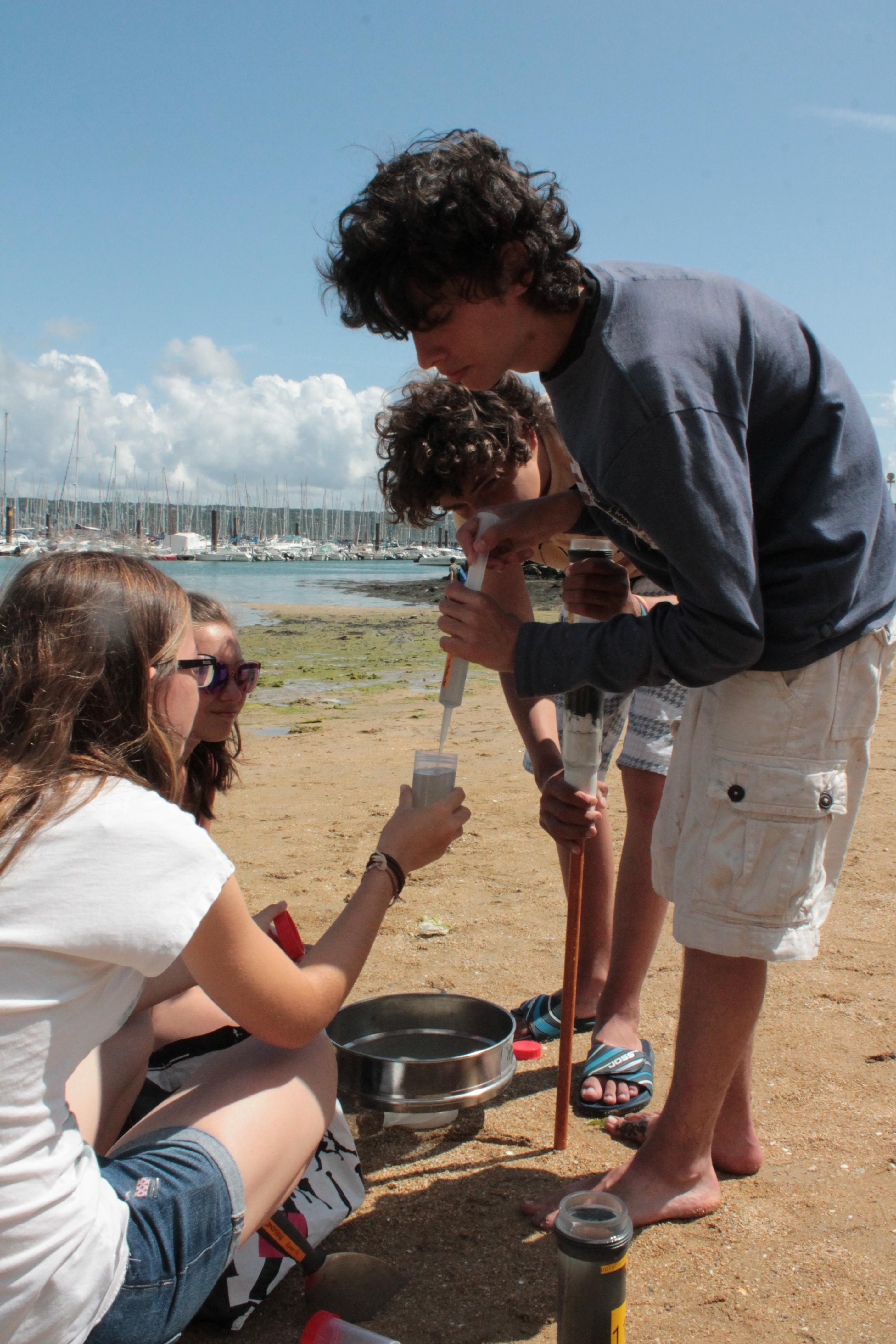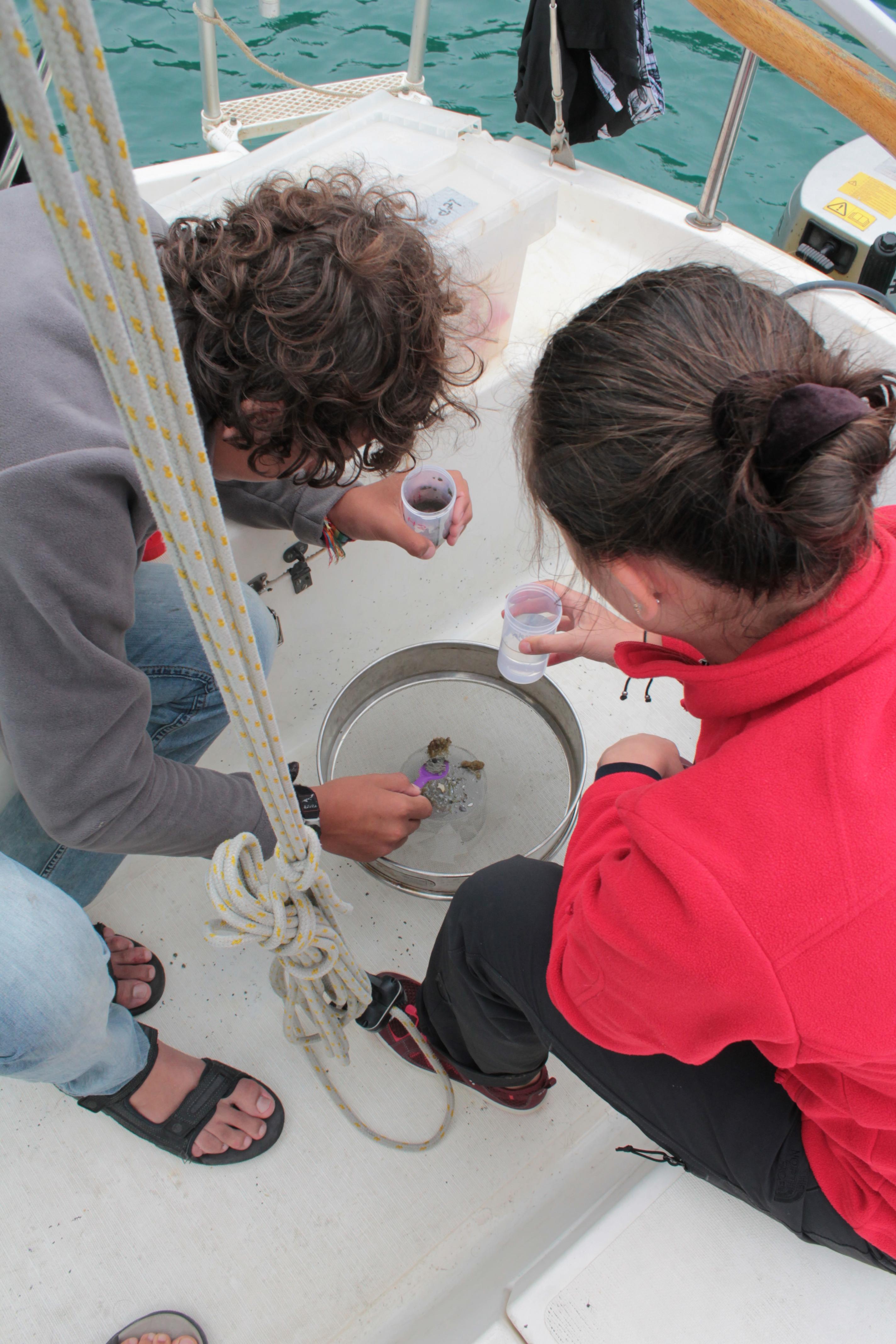Home > Our Camps > Sea and Wonders: SAIL AND SCIENCE IN BRITTANY
To sign up
Add to wishlist
Introduction
Do you like oceans? Does sailing, Christopher Colombus, Magellan or La Pérouse make you dream? This expedition is designed just for you!
The stay
INTRODUCTION
Dare an adventure to the ends of the Iroise marine natural park, a real ocean pearl centred in its jewel box: Britanny. Off peninsula Crozan, the sea spreads below the horizon. But do not be fooled. In these limpid waters are found planktons, and a variety of undiscovered living organisms. Dolphins also spy nearby. On a daily scientific expedition, meet these mysterious animals who rely on you to preserve the first link of our food chain.
Different species of animal or plant planktons (crustaceans, algae, fishes), and marine mammals Marine Mammals Observe marine mammals in the Iroise Sea in Brittany. Watch them develop in their natural habitat. You can do this on ourplakton discovery sailing expeditions. would no more hide anything from you as you take part is the CETIS research project of Objective Sciences International titled: knowing oceans better and committing to their study means beginning to protect them for tomorrow.
THE STAY
Brittany, a ground of sailors, has a strong cultural and environmental identity. The trip will be organised at Iroise sea off Finistère. It is considered the richest place in terms of biodiversity. During this 10-day stay, you will have a feel of sailing pleasures in Brittany and enjoy, at the same time, many Breton traditions including their gastronomy display at parties. Every day, you will get ready to discover the numerous landscapes which make up this unique environment. This will be an opportunity for you to learn the rudiments of sails on a houseboat. Moreover, thanks to you, we will constitute a team of scientific explorers with the aim of providing important data which meet scientific needs. In fact, the sailboat is an ideal platform which gives access to different maritime sites. Days will, therefore, be characterised by various scientific expedition.
THE RESEARCH
The sailing boat is the most choiced means of transportation to visit Brittany. It equally guarantees access to sensitive and protected areas in a non-intrusive manner. Today, oceanographers seek more ways to get citizens, notably sailors, involved in the collection of scientific data. This is, indeed, the one and only means to study the biodiversity that make up time and space in them. We are at the early stage of this participative oceanography initiative. The collaboration between Astrolabe Expeditions and Objective Sciences International goes in line with this approach through the CETIS programme, by encouraging participants to discover the riches of their seas in order to better understand and protect them.
The various plankton Plankton Plankton makes up the first level of the marine food chain. Discover thier importance and let yourself be fascinated by their beauty by taking part in our nature courses on whales and dolphins. samples will constitute data for the new Roscoff Organic Station (CNRS) data base which started a scientific programme for the evaluation and monitoring of Plankton Plankton Plankton makes up the first level of the marine food chain. Discover thier importance and let yourself be fascinated by their beauty by taking part in our nature courses on whales and dolphins. in the whole world. This will help perfect planktonic biodiversity knowledge which is not very known till date, and improve forecast models of its biodiversity and climate change. The Natural Sea Park of Iroise, for its part, will tap from the precious observations you make. These observations will benefit a monitoring programme of the park’s biodiversity with regards to contextual data, thereby enabling the managers to adapt conservation and control measures.
Depending on time and observations, you will also have the opportunity to take part in other participatory observation programmes (jellyfish, macro waste, phytoplankton efflorescence, monitoring foreshores, skate eggs capsules) and start other scientific structures such as Ifremer.
At sea, you will take samples of planktons at different areas following a ludic protocol (3 to 4 samplings over 10 days) The sampling will be done in zones not explored by scientists. Meanwhile, you will take down data such as the weather condition, water and air temperatures, in order to contextualise these samples.
Right from the boat or seashore, you will be part of participatory observation programmes organised by the Iroise Marine Natural Park (PNMI) which have to do with observing a herbarium of eelgrass, hippocampuses, seals and dolphins, wounded or distressed birds, skates and sharks that one meets regularly off its sea coasts.
EQUIPMENT USED
The boat will accomodate the group for sails during the day, and will therefore serve as a measuring platform at sea. In addition to sailing and security equipment, the boat will transport sampling instruments and all analysis equipment will be kept at the accommodation centre. They include:
- double observation instrument;
- camera with telephoto lens for shooting at sea;
- sub-marin video-camera
- sampling instrument (plankton
Plankton
Go on an adventure and discover the little people of the water, plankton, which make up a huge majority of aquatic life. Observe plankton up close with the help of our microscopes and marvel at their beauty. All this is possible on our plankton discovery sailing expeditions.
net and accessories);
- filtration instrument and accessories (filter, pipette, test tube, etc.);
- microscope;
- microscope camera;
- computer.
THE VENUE
The trip will unfold at the Iroise sea which covers a land surface of 3500 km², with 300km of coastal area having, above and beneath the water surface, an important ecosystem, a characteristic of the Breton maritime environment: dunes, cliffs, archipelagos, moors, islands, bottom and sedimentary rocks. This sea was classified as a biosphere reserve by UNESCO in 1988. The variety of these landscapes, added to the sole access through sea to many sites explain why this zone has much biodiversity. This renown sea, though feared by sailors is very navigable in summer. Swells and storms are actually very scarce and on the contrary, turquoise water coves are seen, and islands become easily accessible. The Iroise Marine Natural Park (PNMI), the first French marine park has as objective to protect and develop its riches. It offers a unique natural marine heritage and many professional or recreational activities. The landscapes of the Iroise sea are varied, with striking beauty. The PNMI is a real conciliation instrument between respect for the environment and human activities.
ACCOMMODATION
Lodging will be in quality youth hostels, or in a typical Breton home near the seaport where the sailboat will be anchored. You will get all the necessary comfort: warm bath, comfortable bed, internet access, etc. To ensure that you get a complete feel of life at sea and enjoy your status as a ship’s apprentice, a night spent in a boat at the port could even be envisaged so as to guarantee all the comfort needed on the spot.
DAY TO DAY LIFE ON THE SPOT
The days will be punctuated with daily excursions at sea. The boat will be used not only to carry out the numerous sample taking and observation missions, but also to visit the varied PNMI coast. This will be the ideal way to discover the environs of Morgat (bays, beaches, cirques, rocky coastlines and caves) with a new perspective and to approach marine life without disturbing it. Midday meals will be served at the accommodation centre, in the boat or better still at the anchorage in the most beautiful cirques in Brittany according to research demands. In the evening, returning from the port, you can enjoy community life; pancake and apple juice shall be served. You will also meet Bretons who sustain the land. Initiation to fishing...
TRIP PROGRAMME
The trip will respect a learning and independence progress made on the field. Learning and practical sessions shall be conducted following weather conditions.
They will be intensive and characterised by many sailing expeditions. So, much of learning and practicals shall be done directly at sea.
Themes treated
- Sails:
![]() Discovering the sailboat and learning basic functions.
Discovering the sailboat and learning basic functions.
![]() Sails lift, sails adjustment and maintaining one’s hands on the wheel of the boat.
Sails lift, sails adjustment and maintaining one’s hands on the wheel of the boat.
![]() Notion of location and nautical chart.
Notion of location and nautical chart.
- Sciences :
![]() Discovering maritime micro-organisms and cetacea.
Discovering maritime micro-organisms and cetacea.
![]() The key to identifying maritime species
The key to identifying maritime species
![]() Observation methodology (approach protocol, road organisation and observation method).
Observation methodology (approach protocol, road organisation and observation method).
![]() Sampling and scientific statement methodology.
Sampling and scientific statement methodology.
![]() Microscope photographic technique.
Microscope photographic technique.
- Shooting at sea.
- Life on the spot (depending on time condition):
![]() Discovering the Brittany region.
Discovering the Brittany region.
![]() Coastal sporting activity.
Coastal sporting activity.
Time spent throughout the trip will alternate between learning maritime biology, field practice, sea excursions, and ludic and sporting activities.
_ These various programmes shall be organised and carried out together with youths at the beginning of the trip, with respect to their likes, intelligence, level, etc. It is obviously a participatory sojourn programme!
THE CETIS PROGRAMME
Oceans are the future of the planet. Covering 70% of the earth’s surface, they release 65% of the oxygen we breathe and are the biggest and first link in the overall food chain. An incredible source of life, they contain the richest biodiversity, but less known in the world. The dynamics of currents is the climate machine’s engine; it is the ocean which controls the whole climate and our meteorology. For all these reasons, the study of the ocean constitutes a major issue in our century.
The CETIS programme covers all these topics, and thus, collects data at various levels in order to better understand each component and their interactions.
Knowing the ocean better today means preserving tomorrow’s ocean.
Science Science La science est désormais l’affaire de tous. Découvrez la science d’une manière ludique et active. Nous vous proposons d’en découvrir plus sur nos expéditions à la voile, découverte du plancton. partners of the CETIS programme: Ifremer,Oceanopolis, World’s Plankton Plankton Go on an adventure and discover the little people of the water, plankton, which make up a huge majority of aquatic life. Observe plankton up close with the help of our microscopes and marvel at their beauty. All this is possible on our plankton discovery sailing expeditions. , CNRS...
THE TEAM
The CETIS programme is supported by organisations and a group of enthusiasts.
Le programme CETIS est porté des associations et des équipes de passionnées.
Cédric Courson : Founder and president of the “Astrolable Expeditions” association. He is in charge of the CETIS programme.
A sailor, scientist, and sea and star enthusiast, he is equally the mediator and science
Science
La science est désormais l’affaire de tous. Découvrez la science d’une manière ludique et active. Nous vous proposons d’en découvrir plus sur nos expéditions à la voile, découverte du plancton.
trainer in charge of the scientific and technical content of the programme.
Florent Delorge : Founder of the “Rêver aux Quatre Coins” association, in charge of pedagogy and director of all CETIS sojourn programmes. A primary school teacher and very keen on sports, he is in charge of logistical organisation as well as the pedagogic programme of sojourns.
Anosone Sygnavong and Louise Renard: are both in charge of developing the CETIS programme. It is thanks to them that activities are many and diversified. They also provide answers for all your questions.
Anosone coordinates the “Mix-it-up” programme and is committed to CETIS programme so that our activities can target a larger public.
Louise, for her part, has set up a regional branch in the Carribeans for our trips across the Atlantic.
Hugo Mayere: A state-licensed Skipper, Hugo is the technical skipper and reference who will successfully row boats of the CETIS programme. He equally has a certificate in Biology and Computing, and will coordinate most of CETIS sojourns.
The Astrolabe Expeditions Association, project partner puts its know-how and sailboats at the service of the CETIS research programme.
www.astrolabe-expeditions.org
The Rêver aux Quatres Coins Association injects its expertise and technical know-how into CETIS sojourn programmes.
On the trip: the supervisory staff will be composed of two to three persons as a whole, having the following competencies:
A skipper whose role is to control two sailboats and ensure the crew’s security during crossings. His extensive knowledge on sails and the ocean is an important factor in discovering sails or understanding it better by participants.
Science coordinator: specialised in scientific operations. He will teach participants various operations and observation techniques.
Pedagogy Coordinator: Very familiar with camp trips and all types of coordinations, he will be able to answer all your questions on logistics during the stay.
We chose to constitute a small committee of eight (8) participants so as to create a more friendly environment and favourable conditions for a successful trip and teaching where each individual will be introduced to various activities at a time.
PRACTICAL INFORMATON
Start and end of Trip:
Participants are expected on 6 July as from 3:00 pm at Crozon-Morgat. The trip will end on 5 June at the same venue.
Transportation:
Brest has an SNCF station and airport. However, it is possible to reach Crozon by bus or maritime shuttle.
Equipment:
Envisaging more comfortable shipping equipment is very useful: Sizeable jacket and trousers, lycras and boots are indispensable. Even if the weather in July is favourable in Brittany, the wind can be strong when one leaves the coast. Cold is one of the main causes of seasickness but can easily be avoided with good equipment.
Health Conditions:
A greater part of the trip will be in a boat. So, you do not necessarily have to be trained or be sporty. Nevertheless, it is important to have a good balance at standing, and be able to face a generally calm sea whose waves can, nevertheless, cause slight jolts of the sailboat. On land, you also have to bear in mind that we take walks which sometimes last for hours and cover very long distances.
Academic internship:
We suggest the signing of conventions on internships for students registered for the camp, and who wish that it be validated as a university internship.
FREQUENTLY ASKED QUESTIONS
What should I take along?
Bed and beddings: Prepare a sleeping bag. Mattress fitted sheets are provided for you as well as pillows and their cases.
Sea clothing: Eventhough you are sailing in summer, it could quickly become cold and damp at the water level. Crossing boots (in addition to brogues) jackets, overalls, fleece are necessary.
Image/video/computer equipment: though equipment is provided for on the spot, you can, if you wish bring along your own Image/video/computer equipment to be more at ease. Coordinators are also there to assist you on making the most of them (assistance on camera or software installation on your computer)
=> Indispensable : Do not forget caps, hats, sun cream and sun glasses (preferably polarizing)
What happens if I catch seasickness?
seasickness is not the worst thing that can happen; everyone can become sick (like how you catch a cold) and so it can be avoided. For this reason, you have to be active all the time and understand your body needs (like going to bed once you feel tired and eating when hungry). People usually talk of the 3 F rule: not to Feel hungry, Feel cold and Feel tired! Having a strong mind is also an important factor to fight against seasickness (strive to be alert and active rather than giving in to pitching or tiredness).
Nonetheless, some people are more exposed than others. That is why it is advised to consult your doctor/pharmacist on these issues so as to have, if necessary, the right medication (anti-travel sickness tablets, say Mercalm, anti-seasickness bracelets, etc.).
It is better to take precautions because seasickness can easily spoil your day!
The familiarization aspect is equally important. Generally, after two nights at sea, your body adapts to the environment.
Do I need to have sailing experience to take part in this sojourn?
This trip means sailing for some hours during the day. Technically speaking, no particular competence is required, neither on sails nor sciences. Everything will be taught on the spot.
Should I envisage special clothes?
Yes, sailing can be enduring and cold. So warm polarized clothing for walks should be envisaged, as well as waterproof dresses covering the chest and legs (waterproof jacket and k-way trousers.
Taking along warm clothes in summer is usually undermined, whereas rowing a boat for long hours during the night against the wind can cause one to easily catch a cold, leading to fatigue (calorie loss) and seasickness. To avoid this, it is important to keep very warm.
Can one recharge electric apparatus in a boat?
At the port just like at the centre, we have access to 220V and so there is no limit in recharging your apparatus. At sea, the ship just has a socket of 12V and it is limited. Batteries are therefore mainly reserved for on-board instruments use. However, it is possible, during crossings, to connect your computer to the 12V socket of the boat for use or recharge (exactly like in a car).
Phones are needless at sea given the absence of network.
Can one make a call/communicate at sea?
There exists communication devices at sea which enable basic exchanges between ships or with ports, mainly to receive weather forecast or indicate assistance request.
Everything that has to do with phone or internet communication will have to wait on return to the port and accommodation centre.
SPONSORS
- Photo par Fred Tanneau
Daniela Zeppilli, PhD, former PhD student International Excellence in Sea Sciences
LabexMER University of Brest, European University Institute of the Sea, French Research Institute for Sea Exploitation"I am a Woman, I am a Mother, I am a Scientist and I love the Sea. Those are my four reasons for supporting Objective Sciences International trips. I would have loved to discover this type of science camps Science Camps Our science camps are vacation camps where your children will discover a scientific domain which speaks to them: astronomy, archaeology, marine ecology... At the same time the will be able to do various outdoor activities: archery, swimming, hiking.... when I was a child.»
Reviews
FAQ
I am very interested in the Brittany camp for my daughter. She is 15 now but will be 16 before the trip. Can she still be allowed? Also, can you confirm the dates of the trip as the website says July 5-June 4. I tried to open the form to sign up but was not able to find it online. Is there still space available?
Thank you! Juli Jessen
Ask a question










